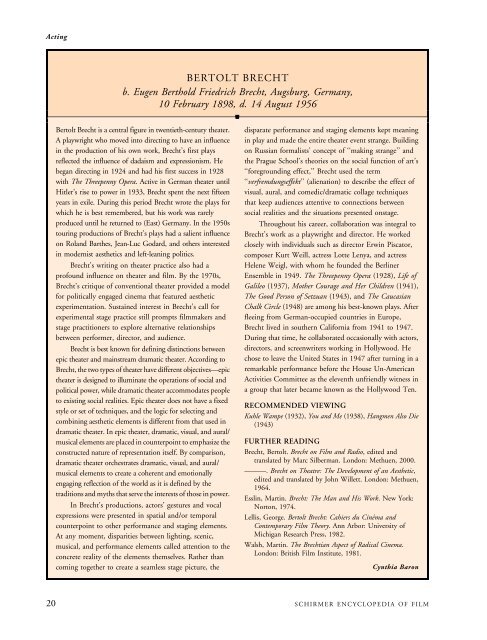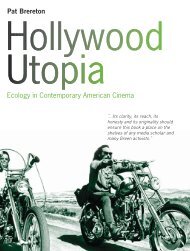Schirmer Encyclopedia of Film
Schirmer Encyclopedia of Film
Schirmer Encyclopedia of Film
Create successful ePaper yourself
Turn your PDF publications into a flip-book with our unique Google optimized e-Paper software.
Acting<br />
BERTOLT BRECHT<br />
b. Eugen Berthold Friedrich Brecht, Augsburg, Germany,<br />
10 February 1898, d. 14 August 1956<br />
Bertolt Brecht is a central figure in twentieth-century theater.<br />
A playwright who moved into directing to have an influence<br />
in the production <strong>of</strong> his own work, Brecht’s first plays<br />
reflected the influence <strong>of</strong> dadaism and expressionism. He<br />
began directing in 1924 and had his first success in 1928<br />
with The Threepenny Opera. Active in German theater until<br />
Hitler’s rise to power in 1933, Brecht spent the next fifteen<br />
years in exile. During this period Brecht wrote the plays for<br />
which he is best remembered, but his work was rarely<br />
produced until he returned to (East) Germany. In the 1950s<br />
touring productions <strong>of</strong> Brecht’s plays had a salient influence<br />
on Roland Barthes, Jean-Luc Godard, and others interested<br />
in modernist aesthetics and left-leaning politics.<br />
Brecht’s writing on theater practice also had a<br />
pr<strong>of</strong>ound influence on theater and film. By the 1970s,<br />
Brecht’s critique <strong>of</strong> conventional theater provided a model<br />
for politically engaged cinema that featured aesthetic<br />
experimentation. Sustained interest in Brecht’s call for<br />
experimental stage practice still prompts filmmakers and<br />
stage practitioners to explore alternative relationships<br />
between performer, director, and audience.<br />
Brecht is best known for defining distinctions between<br />
epic theater and mainstream dramatic theater. According to<br />
Brecht, the two types <strong>of</strong> theater have different objectives—epic<br />
theater is designed to illuminate the operations <strong>of</strong> social and<br />
political power, while dramatic theater accommodates people<br />
to existing social realities. Epic theater does not have a fixed<br />
style or set <strong>of</strong> techniques, and the logic for selecting and<br />
combining aesthetic elements is different from that used in<br />
dramatic theater. In epic theater, dramatic, visual, and aural/<br />
musical elements are placed in counterpoint to emphasize the<br />
constructed nature <strong>of</strong> representation itself. By comparison,<br />
dramatic theater orchestrates dramatic, visual, and aural/<br />
musical elements to create a coherent and emotionally<br />
engaging reflection <strong>of</strong> the world as it is defined by the<br />
traditions and myths that serve the interests <strong>of</strong> those in power.<br />
In Brecht’s productions, actors’ gestures and vocal<br />
expressions were presented in spatial and/or temporal<br />
counterpoint to other performance and staging elements.<br />
At any moment, disparities between lighting, scenic,<br />
musical, and performance elements called attention to the<br />
concrete reality <strong>of</strong> the elements themselves. Rather than<br />
coming together to create a seamless stage picture, the<br />
disparate performance and staging elements kept meaning<br />
in play and made the entire theater event strange. Building<br />
on Russian formalists’ concept <strong>of</strong> ‘‘making strange’’ and<br />
the Prague School’s theories on the social function <strong>of</strong> art’s<br />
‘‘foregrounding effect,’’ Brecht used the term<br />
‘‘verfremdungseffekt’’ (alienation) to describe the effect <strong>of</strong><br />
visual, aural, and comedic/dramatic collage techniques<br />
that keep audiences attentive to connections between<br />
social realities and the situations presented onstage.<br />
Throughout his career, collaboration was integral to<br />
Brecht’s work as a playwright and director. He worked<br />
closely with individuals such as director Erwin Piscator,<br />
composer Kurt Weill, actress Lotte Lenya, and actress<br />
Helene Weigl, with whom he founded the Berliner<br />
Ensemble in 1949. The Threepenny Opera (1928), Life <strong>of</strong><br />
Galileo (1937), Mother Courage and Her Children (1941),<br />
The Good Person <strong>of</strong> Setzuan (1943), and The Caucasian<br />
Chalk Circle (1948) are among his best-known plays. After<br />
fleeing from German-occupied countries in Europe,<br />
Brecht lived in southern California from 1941 to 1947.<br />
During that time, he collaborated occasionally with actors,<br />
directors, and screenwriters working in Hollywood. He<br />
chose to leave the United States in 1947 after turning in a<br />
remarkable performance before the House Un-American<br />
Activities Committee as the eleventh unfriendly witness in<br />
a group that later became known as the Hollywood Ten.<br />
RECOMMENDED VIEWING<br />
Kuhle Wampe (1932), You and Me (1938), Hangmen Also Die<br />
(1943)<br />
FURTHER READING<br />
Brecht, Bertolt. Brecht on <strong>Film</strong> and Radio, edited and<br />
translated by Marc Silberman. London: Methuen, 2000.<br />
———. Brecht on Theatre: The Development <strong>of</strong> an Aesthetic,<br />
edited and translated by John Willett. London: Methuen,<br />
1964.<br />
Esslin, Martin. Brecht: The Man and His Work. New York:<br />
Norton, 1974.<br />
Lellis, George. Bertolt Brecht: Cahiers du Cinéma and<br />
Contemporary <strong>Film</strong> Theory. Ann Arbor: University <strong>of</strong><br />
Michigan Research Press, 1982.<br />
Walsh, Martin. The Brechtian Aspect <strong>of</strong> Radical Cinema.<br />
London: British <strong>Film</strong> Institute, 1981.<br />
Cynthia Baron<br />
20 SCHIRMER ENCYCLOPEDIA OF FILM
















